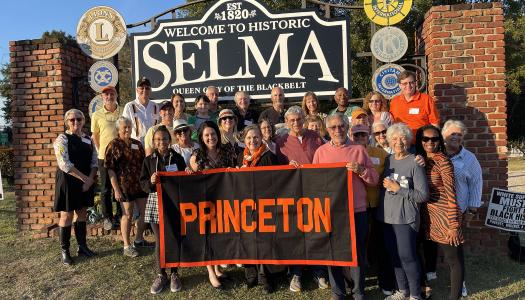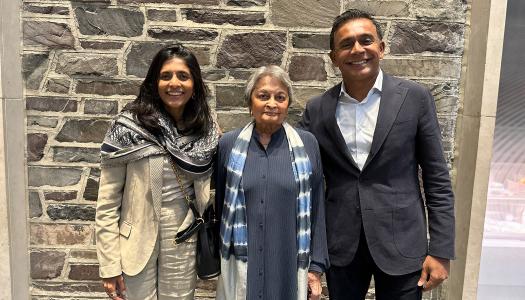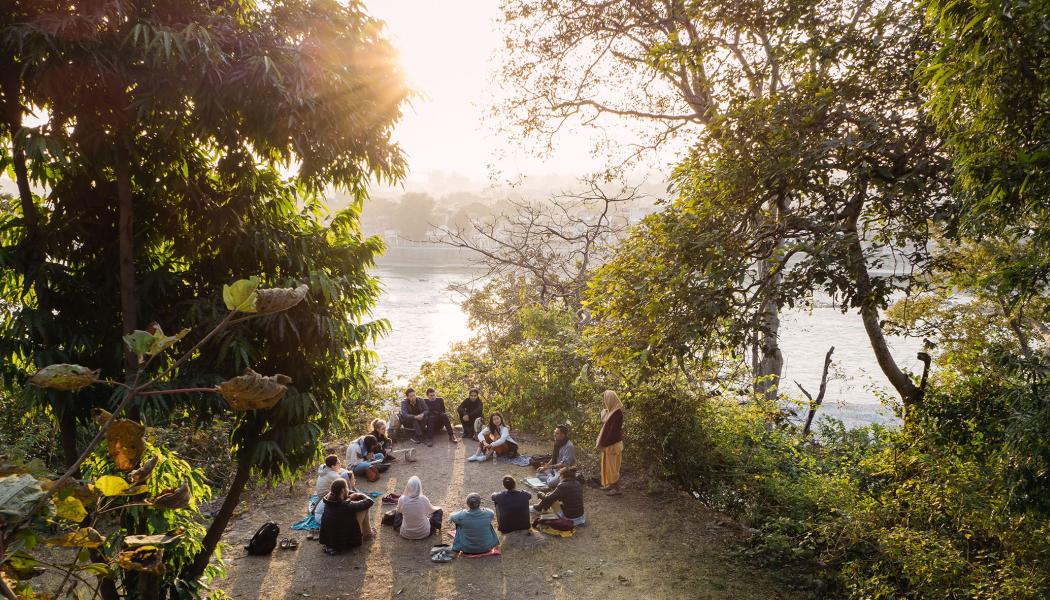
Princeton Journey’s India Immersion trip will include impromptu meditation sessions in inspiring spots, like this one in Rishikesh, led by Vineet Chander as part of the University’s Yoga and Meditation Fellowship program. Photo by Malte Moeser *22
Breathe in. Look around. You’re on a mat, perched on a cliff, overlooking the Ganges River. More than half a century ago, four longhairs from Liverpool were here in Rishikesh too, seeking spiritual exploration and creative rejuvenation at Maharishi Mahesh Yogi’s sacred secluded dwelling, or ashram.
Breathe out. The grounds are now a nature preserve, colloquially called the Beatles ashram. But this ancient town at the foot of the Himalayas, known as the yoga capital of the world, still thrums with the energy of those who have come before for centuries, hoping for enlightenment. Gathered with your fellow travelers on their own mats, it’s time for a chat about philosophy.
Princeton Journeys is going to India on a trip with a unique twist. In December 2025, the program will offer a one-of-a-kind visit where participants can immerse themselves in the energy and spirit of the land.
“This is something a little bit different — something that’s much more experiential, that goes beyond just encountering the places we visit, but actually has more to do with — at the risk of sounding like a cliché — the journey within as well,” said Vineet Chander, assistant dean, Hindu life, in Princeton’s Office of Religious Life, who will co-lead the trip with Angela Quinn, an administrator with Princeton Journeys. The itinerary will include visits to temples, wellness centers and sacred grounds, as well as conversations with yogis and other spiritual leaders, daily yoga and meditation practice, and philosophy discussions.
While “India Immersion: Yoga and Meditation” will be Chander and Quinn’s first Princeton Journeys excursion to India, it won’t be the first time the pair has led Princetonians on the subcontinent. The two are also co-leaders of the University’s Yoga and Meditation, with plans underway for a third trip this winter.
The idea for the fellowship formed over time. Chander, an American-born Hindu priest, arrived at Princeton in 2008 as the University's first Hindu chaplain and noticed a growing interest among students, faculty and staff in Indian-centered meditation and yoga culture. He explains that while the most well-known aspect of yoga culture in the West is asana — the physical postures — yoga, which means “union,” is more expansive and holistic, including “systems of metaphysics, of theology, of philosophy, of what we might call today ‘mindful practices.’”
Chander met Quinn in 2016 when she started studying yogic scripture with him off-campus. He learned she had been teaching asana in the Princeton community for almost 10 years. A teaching partnership was formed. Working together, the two mapped out plans for the Yoga and Meditation Fellowship program.
The two have taken Princeton students the crowded streets of Mumbai to remote villages in the countryside. Their robust itinerary incorporates time and space for impromptu discussions and practice sessions that are sometimes impromptu, inspired by exceptional settings.
Joanna Zhang ’19 was in the first fellowship cohort, which went to India in December 2017. Already an asana practitioner, she was drawn to the fellowship for several reasons. “I think there’s just something sacred about getting together with people with this intention of grounding yourself. I also have this intellectual curiosity about learning about different philosophies and religions,” she said, adding that she was intrigued by the potential benefits for her mental health and sense of well-being and connectedness with other people.
A trip to the Govardhan Ecovillage particularly resonated with the ecology and evolutionary biology major, who now works on environmental policy for a nonprofit. The popular wellness ashram in the countryside north of Mumbai is a self-sustaining role-model village. “Philosophically, it was super interesting,” Zhang said. “One of the monks explained how Eastern religion is circular — you come back — and how that circular versus linear way of thinking about life affects consumer cycles as well.”
While the Princeton Journeys trip is still being planned, Quinn said travelers can expect some time at Govardhan. “It’s a very beautiful and sacred setting where people go specifically for the purpose of studying yoga,” she said. “It’s a really transformational place to spend time. We’ll have vegetarian cooking lessons while we’re there and meet the lead teacher, who is Vineet’s teacher.”
Quinn and Chander noted that many of the essential elements of the fellowship trips will be echoed in the Journeys trip, including daily philosophy discussions with Chander and daily asana and meditation practice with Quinn.
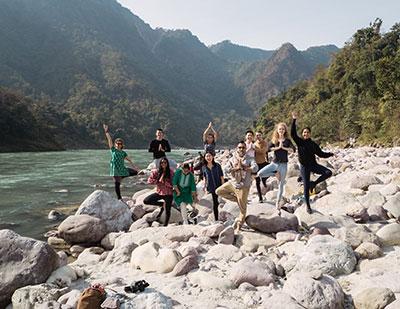
Sinem Uysal *21 was a graduate student in the Operations Research & Financial Engineering department when she became a fellow in the second cohort in 2019. For her, these daily personal interactions helped make the fellowship experience magical. She appreciates how the trip broadened her understanding of yoga culture, and she credits the experience with giving her tools she uses daily in her job in finance: “I think yoga really teaches you how to be comfortable in uncomfortable positions.” She also found it grounding, she said, to “take that time just to sit, and think about how I want to be, in this world — who I want to be, and how I want to carry myself.”
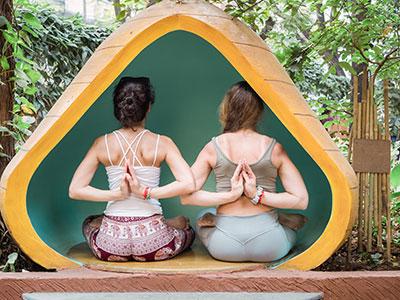
Chander is thrilled to reframe the fellowship as a Princeton Journeys opportunity. “I’m so excited about the model of a trip structured around an experience for alumni, particularly alumni spanning maybe different generations and backgrounds,” he said. “No two days will be alike. An experience like this, so much of it is a matter of being in different spaces, sacred spaces.”
For her part, Quinn retains a vivid memory of Chander’s impromptu philosophy session on the cliff at the Beatles ashram. “I’ve spent time at that ashram before, and I’ve never seen that happen there. We’re really creating these very unique experiences and lasting memories for the fellowship.
“I think this is going to be epic for our Journeys travelers as well.”
Meet the trip’s co-leaders
Dr. Vineet Chander, Princeton University’s Hindu chaplain, is an American-born Hindu priest and educator. His areas of specialty include Bhakti, the Bhagavad-Gita and models of pastoral counseling. He has studied the theology and praxis of Hinduism’s Chaitanya Vaishnava tradition in both the United States and India. He earned his J.D. from the George Washington University Law School; his M.A. in religious studies at Rutgers University; and his doctorate in education from New York University. He co-leads Princeton University’s Yoga and Meditation Fellowship.
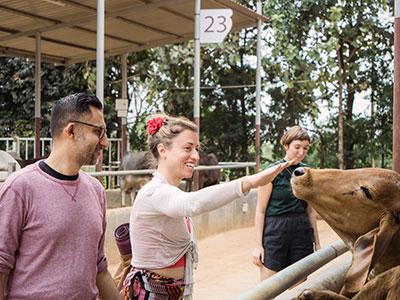
Angela Quinn began studying the science of yoga in India in 2011, where she also began the practices of pranayama, pratyahara, kriya and meditation. Two additional trips to India furthered her yogic studies. She has a B.A. in international relations and affairs and a master’s in education. Before joining the University staff as lead yoga instructor for campus recreation, she taught yoga in the Princeton community for more than a decade. In 2022, she joined the University’s Advancement team as an administrator for Princeton Journeys. She co-leads Princeton University’s Yoga and Meditation Fellowship.

